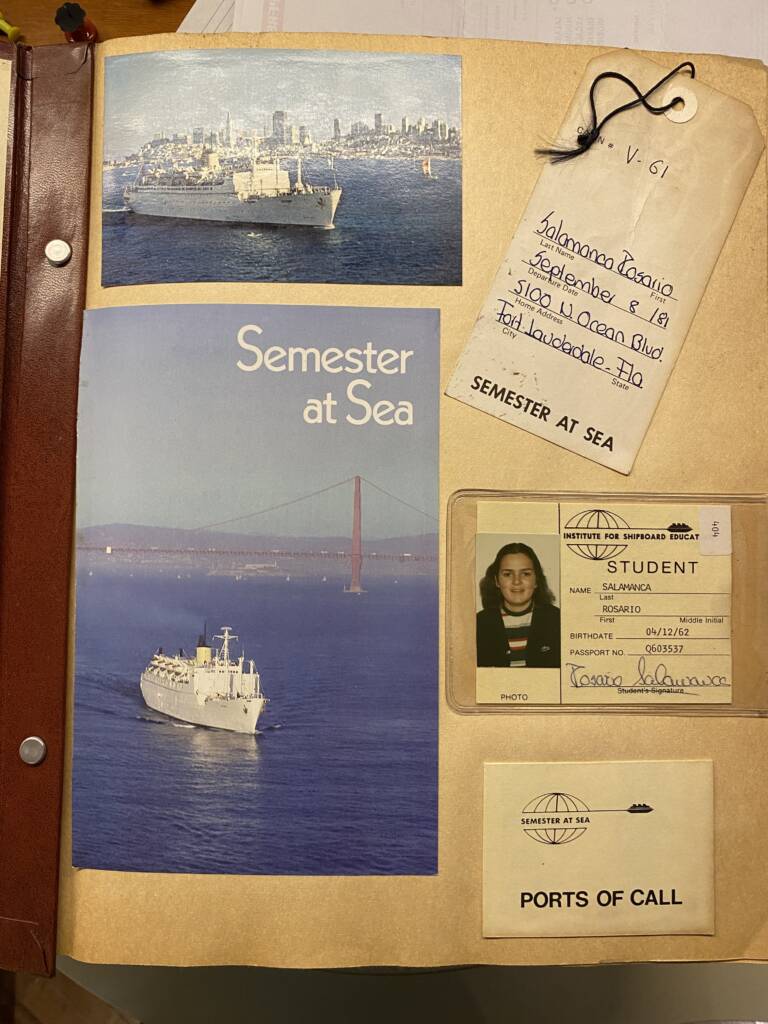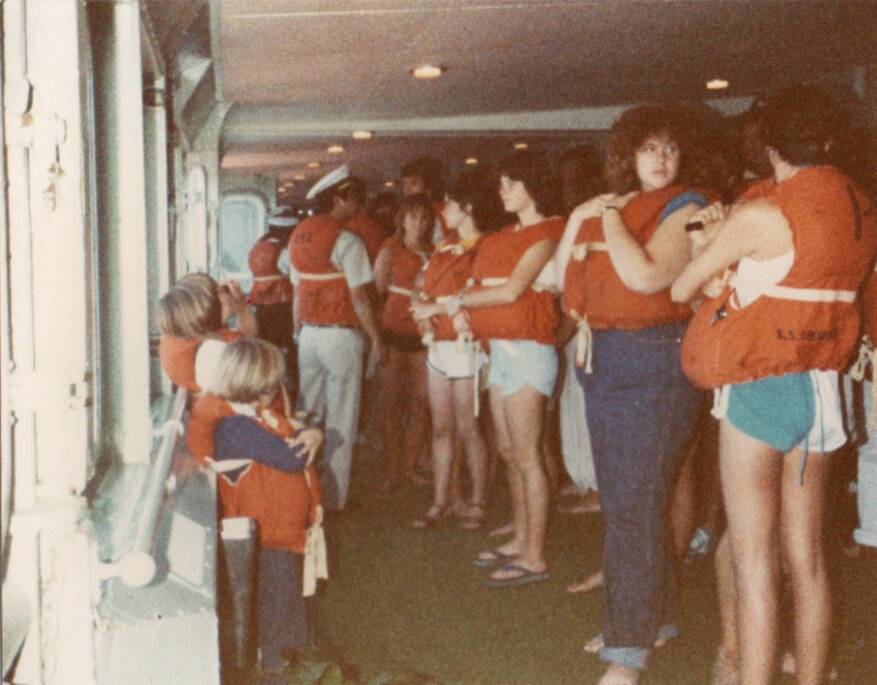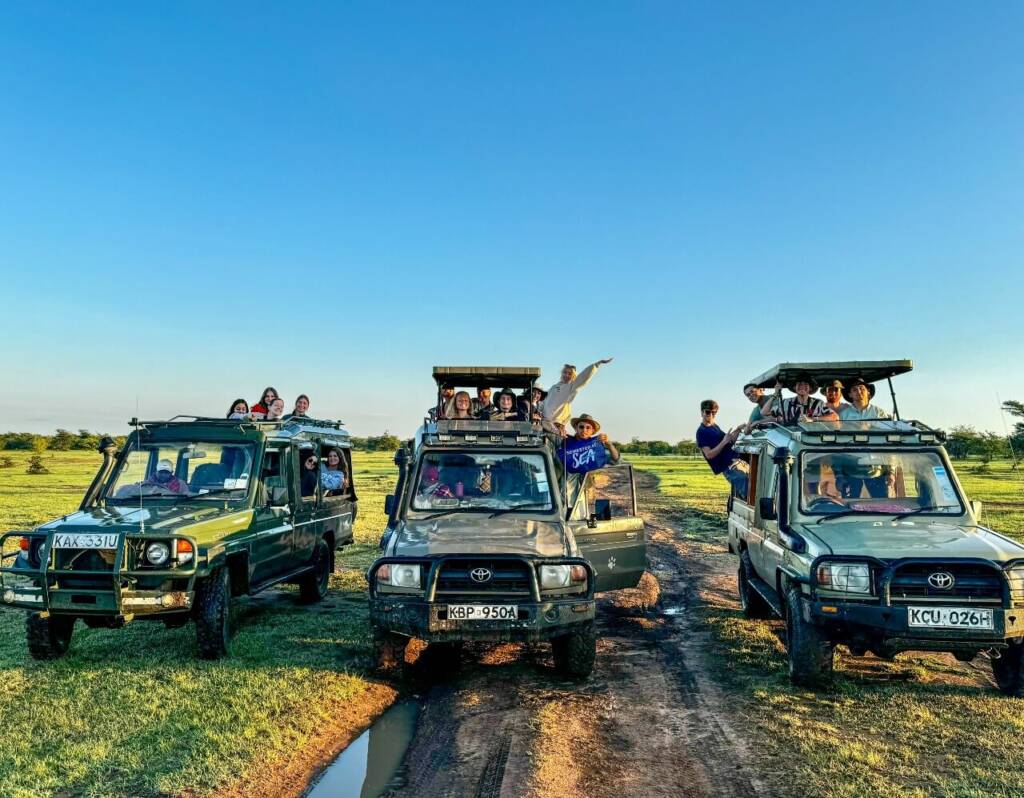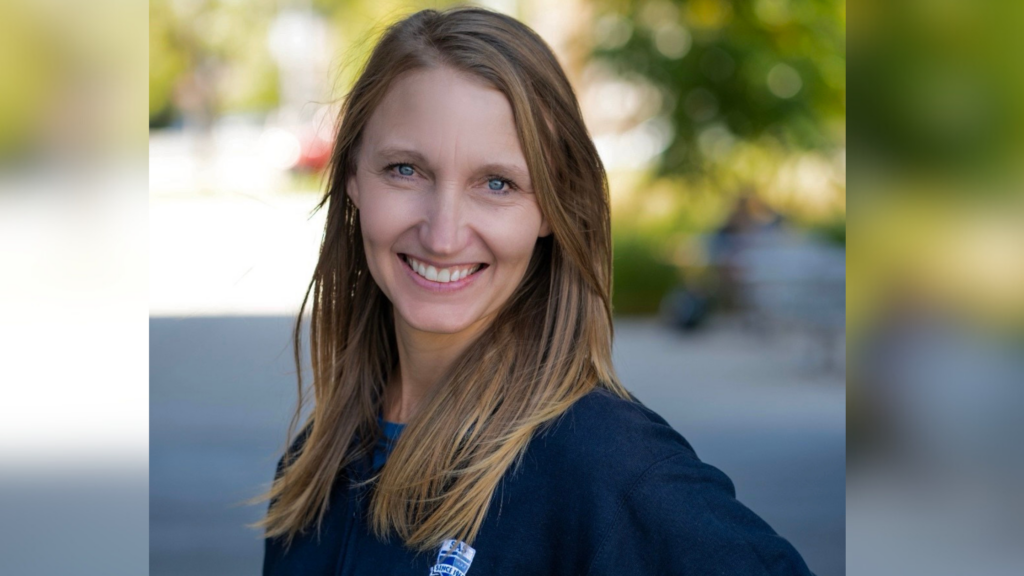As Executive Dean Marti Fessenden put it in her interview, “The feeling on the ship is unparalleled. You will talk about this for the rest of your life.” We see this in our alumni community, and notably on the Spring 2024 Voyage, we see this in legacy voyagers that come on board, inspired by the stories of family members who voyaged before them.
Sofia Betancourt is one of those voyagers. Her mother, Rosario Salamanca, traveled on the SS Universe in the Fall of 1981, and her brother, Juan Jose Betancourt, joined the program in 2015. Join us in exploring her experience as not only a legacy voyager but also as a postgraduate student from Colombia.
Tell us about yourself!
Okay! I’m from Colombia, I’m a postgrad, I’m a psychologist now, and I went to university in Colombia.
Your mom and brother did Semester at Sea. What was the impression they gave you about the experience?
I had a lot of expectations. They had an amazing experience overall and it was magical for them. So I had a lot of expectations about my own experience growing up with their stories. The difference is that they came on the voyage as gap year students, and I’m a postgrad, so it’s different for me. Of course, both of their experiences were really different from each other too. My first impression was, “Whoa this is going to be the journey of my life.”


How would you say it’s different for you being a postgraduate student versus your mom or brother as a gap year student?
I’d say that gap year students are just learning how to be someone in college or university. It’s your first experience, meeting so many people around the same age as you and you’re still naive—it’s a great experience to have this as your first encounter with college. It can be overwhelming too, but if you’ve done this, of course, you can get through college afterward.
As a postgrad, I’ve been through these stages already. Sometimes I talk to people and don’t quite relate to everything they’re talking about because I went through it already. They have to live it, talk about it, and do their thing; but at the beginning, it was hard for me to connect with people deeply. After accepting things as they are, everything has changed so much. I like to approach the other students with humility, and I am open to what they have to offer; not just dismissing them for being at a different stage. We’re all on the ship. I’m learning from them.
As a postgrad, I think I can approach classes and the things I’m learning with more of a mature mindset. Now I’m really into studying, and really into doing homework. When you’re in college, these are things you do because you have to do them, but right now this is something I actually like to do.

A boat drill during Rosario’s voyage in 1981
You had mentioned in a SAS alumni podcast before embarkation that you had anxiety around being Colombian and having a different identity from the majority of your US counterparts on the ship. How have you felt now that you’re on board?
I think that being Latinx in a US environment is quite challenging sometimes, especially with the language and the slang. I’ve been to the US before, and I grew up with US culture in Colombia, but it’s different to approach a country as a guest and then to live with them. So yes, it’s been challenging, but at the same time, I’m liking what I’m living. I can practice my English, I can reach new people who have a different mindset than me. I’ve also met a Latinx group, we’re a maximum of 10 people, but it’s nice to get their perspective.
At the same time, being different is nice because I embrace the culture. If I can’t speak well in English, they will tell me kindly, “You can’t say this,” or “You say this.” I get to learn new things, and also they seem to be interested in Colombia, so I like to share that with them.
So you’ve found a Latinx community. That could mean a lot of things: people who grew up in various countries across Latin America, people who immigrated to the US, or people who are US-born and have family in Latin America. Where are the people in the group from?
The Latinxs here are mainly from the United States or are living in the US now. I’ve met one Mexican girl who lives in Mexico, and I live in Colombia. At least for now, we are the only two people I know who are living in Latin American countries. Of course, there are Latinx that are in the US for college, and who have family back in their countries.

Wow, there are over 400 students on the ship; how did you find the Latinx community?
It’s kind of crazy, I met one of them because he’s cousins with one of my distant relatives. We chatted before coming here and we made the connection. I found people because they speak Spanish. So if I’m walking around and I hear it, I’ll be like, “Oh! You’re speaking Spanish, where are you from?”
What’s an example of slang you’ve learned here?
There isn’t a particular thing I haven’t heard before, but it’s not something that I use in my daily language so it’s hard to keep up with. For example in WhatsApp chats, you don’t always write out the whole word, so I’m like, “What does that mean?” But it’s nice and it’s fun to learn that because it’s part of US culture.
What’s an example of Colombian slang that you use every day?
Chevere. It means, “That’s cool.” There are a lot of Colombian sayings that go through my mind because I think in Spanish so I have to translate it all.

Who has been your MVP on the voyage?
This is going to sound a little bit ego-centric, but I think me! It’s tricky because I’ve worked so much on myself, spent so much energy, and invested in being healthy throughout my daily life. In the beginning, it was overwhelming; there was the socializing, the culture, the language, and there were so many things to take in. But at the end of the day, I know that my roots are stable, and I can come back to myself whenever I feel overwhelmed. I look for quiet places, silence, and spots where I can be comfortable. Although I don’t want to say I only have myself because that’s not true. I have a huge community of people helping me, especially my RD, Sierra, and my roommate. Some people are willing to hear me and support me in my transition to come here. Oh, and especially the Lifelong Learners! There have been a couple of conversations that I keep deep in my heart. It’s amazing to listen to them and learn from their experiences to help me build my life.
What was your intention for the voyage?
I think I intend to grow, and I’m doing it every single day. I’m learning different things from myself, others, and cultures. I’m in an open-minded state. But I do think it has changed because I am learning to be more humble. That’s something I didn’t notice before—I like to be a leader and to teach people things. Now I want to be not only the teacher but the student sometimes. It’s okay to allow others to teach me things and I can learn from them as much as they can learn from me.



